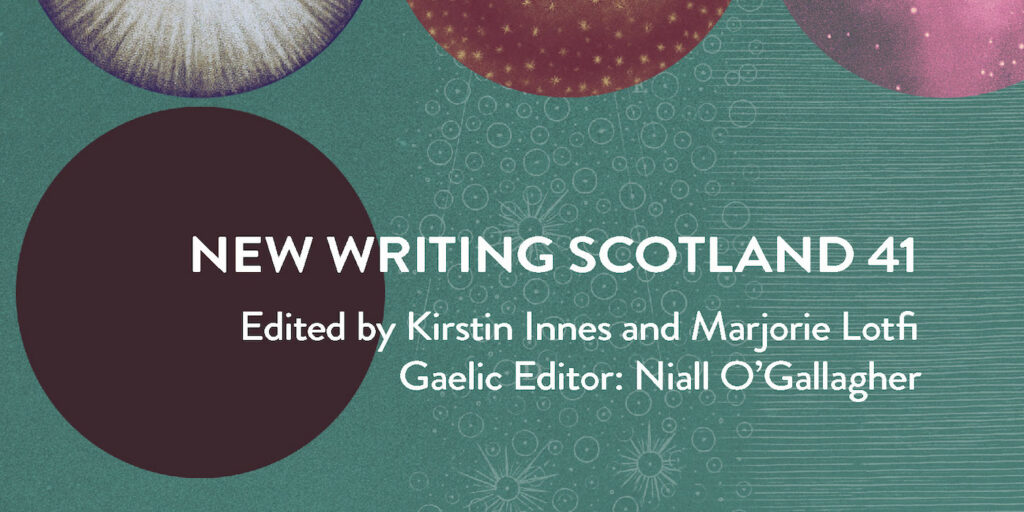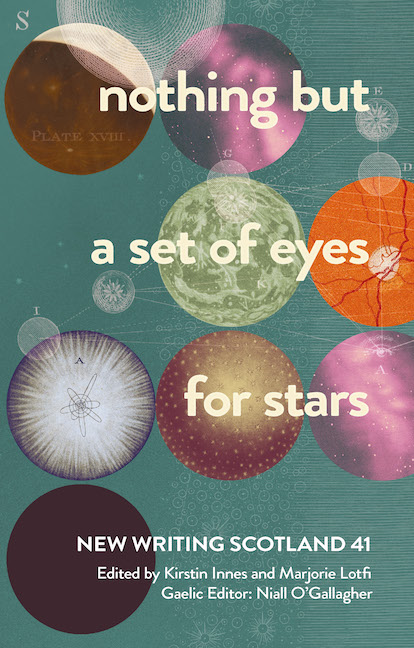
Order nothing but a set of stars: New Writing Scotland 41
Our outgoing editor Marjorie Lotfi introduces New Writing Scotland 41
It’s simply stunning that this is the third of my New Writing Scotland issues, and the end of my time as co-editor. These three years have passed slowly – at times at a snail’s pace – and they’ve also passed in a flash. The writing we’ve considered in that time has also come full circle. For the past two issues, we received a lot of pandemic writing, reflecting on the state of the world (and our own micro-environments). While it was important that we acknowledged that unique time in issues 39 and 40, we also felt a real reticence to include too many of those ‘pandemic’ voices, knowing that we, like our readers, also needed an escape from that reality and reminder of more ‘normal’ times, whatever that meant.
The work submitted for issue 41, however, felt different to earlier submissions: braver, more edgy, less aggressively embodying of the safety we all sought during the pandemic. Instead, so much of the writing submitted (and selected) peeks through the cracks of doors, pushes boundaries, asks the reader to step out of the known and comfortable. As always, it was incredibly difficult to choose just over forty pieces of writing from the hundreds and hundreds submitted and we had a difficult time whittling it down to the very fine pieces included here.
Cover design: Mark Mechan, Red Axe Design
Like the world around us, the poetry selected for this issue looks again at what we thought we knew well, things that are familiar but also somehow changed. Nasim Rebecca Asl’s memories of Persian food lead her to reflect on the passage of time in a family context, for example; Lynn Valentine’s ‘A Car Draws Up’ takes the reader to a familiar place but also identifies what is missing (those who held our hands ‘are nowhere near’); and Ryan Van Winkle’s ‘Flight Path Away’ reminds us that no matter how confident we are about finding our way back home, ‘there will be a final leg, a one-way trip towards a time when / no map will help [us] plot a way’. John Duffy’s ‘Average contents, 48’ looks again at something familiar, in this case our hands, while Jay Whittaker’s poems remind us that re-entering this familiar and equally unfamiliar world can be as out of place as an abandoned ice cream van in midwinter – how ‘One shove … / plunged me headlong / down this steep, wooded bank. / I lie in pieces … / I long for spring.’ Jay’s other poem, ‘Mistaken’, also flags the frail and often indiscernible line between life and death, speculating that things we assume long dead are instead hibernating, simply ‘shrivelled in … spirals to survive.’
The fiction in this year’s section also manifests a certain post-pandemic sensibility. Time and again as we read through the submissions, we met characters on the edge – of change, of social tightropes, of their nerves. Time and again, our skin prickled – reading these stories is not a cosy experience, this year. Almost every story crackles with tension, or anxiety, and often that is rooted in latent body horror, whether the awareness of a growing tumour in Claire Deans’s ‘An Unkindness of Ravens’, or the filthy fingernails of the father in Julie Rea’s ‘Cannibals’ – even the joyous, sensual awakening of Amy Stewart’s ‘The Orange’ is overwhelmingly, swooningly corporeal. Perhaps we have become more conscious of our physical selves, their limitations, just like the protagonist of Katie Webster’s ‘Skin Taste Touching,’ all too aware she’s trapped in a body in a psychiatric ward.
Death, illness, claustrophobia and decay stalk these stories, from Lucy Cunningham’s heartwrenching ‘Swedish Fish’ to the slow-dread reveal of B. A. Didcock’s creeping, unsettling ‘The Birthday Parties’. And these are haunted pages. There are many, many ghosts. Covid is almost always there, even when it isn’t mentioned; surely the all-too-realistic horrors of a community plagued by rats in Julie Laing’s terrifyingly plausible ‘A Mischief’ (which will crawl up your skin and stay there, be warned) could only have been dreamed up after the unsettling times we’ve been through.
Yes, unsettling times seems about right, and it’s a delight – albeit at times a terrifying one – to see how Scotland’s writers are chronicling them.
